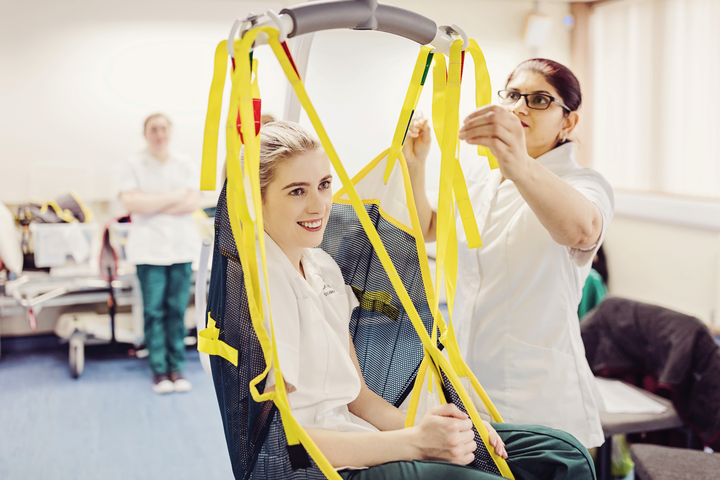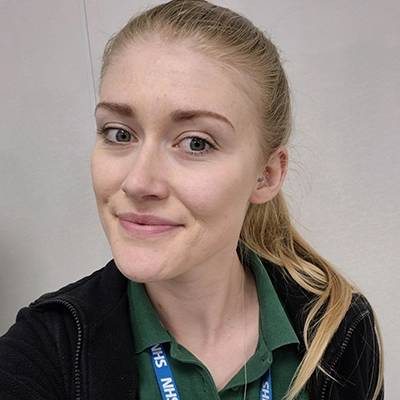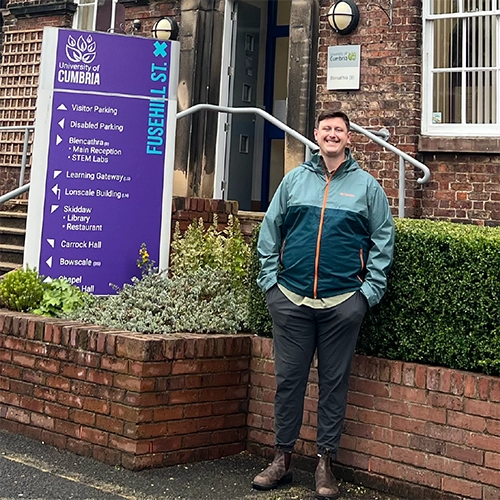MSc - Occupational Therapy (Pre-registration)
Are you wondering how to become an occupational therapist? Do you want to help others achieve their goals and help improve people's lives? Become a champion for the rights and beliefs of people to take part in the occupations that they need and value.
Our innovative occupational therapy degree is accredited by the Royal College of Occupational Therapists (RCOT) as the professional body and approved by the Health Care Professions Council (HCPC). Our degree is designed to equip you with the skills and professional qualifications required for you to become an occupational therapist.

Course Overview
The MSc Occupational Therapy degree at University of Cumbria provides you with excellent training to become a highly skilled and knowledgeable occupational therapist. We will support you to gain a wide range of up-to-date professional and practical skills so you can help people to do all the occupations they need and want to do. Our degree will enable you to become a part of a hugely diverse and person-centred profession which transforms people’s lives through occupation.
Our programme offers you varied ways in which to learn with increased practical learning in a range of settings from classrooms, practical skills rooms such as our mock ward and flat. In our impressive simulation facilities, we will work with you to apply your theoretical learning to simulated real-world scenarios. These will enable you to build your confidence and skills in safe and supportive practice environments, before progressing to real-life cases.
Throughout the two years of your Master's degree we provide you with at least 1,000 hours on placement in a variety of settings with children, adults, and older adults with physical, social, or mental health challenges. We have extensive practice placement providers and so can offer you a broad range of placements in physical, mental health, children’s services and learning disabilities. Travel to your placement may be up to 90 minutes each way, for some placements. Your final placement is elective, this means you can choose where your placement takes place within the United Kingdom or the wider world. Further information about what makes an eligible elective placement will be given at the beginning of the programme.
We are regulated by the Health and Care Professions Council (HCPC) and our Professional Body is the Royal College of Occupational Therapists (RCOT). You will be eligible to apply for registration with the HCPC and apply for membership RCOT upon graduation. Our graduates have an outstanding reputation making them sought after by a multitude of employers including the NHS, councils, private, voluntary, and independent sector organisations.
On this course you will...
- Be a member of a close-knit cohort and work in small groups with your peers, with excellent learning support from highly experienced occupational therapists.
- Benefit from our practical approach to teaching and learning in our purpose-built mock wards and flat as well as simulation suits.
- Be fully supported by our teaching and student support teams, enabling you to learn your way.
- Experience and learn from a range of practice placements which you are well prepared for with pre-placement practical skills and simulation learning.
- Have a personal tutor who will support you throughout your time on the programme, providing extra academic and pastoral support.
What our students and graduates say
-
![Claire Hyland]()
Don’t worry about your age or seemingly irrelevant experience when it comes to occupational therapy. As long as you’re driven, have a purpose for studying OT, and some relevant experience in healthcare, you will succeed. It’s a career where life experiences enrich your performance as a budding clinician.
Claire Hyland
Claire is a current MSc Occupational Therapy student from Ireland. Having transitioned from an arts degree to occupational therapy, she completed her placement on the Isle of Man working in a reablement team, helping to ensure people stay as independent as possible for as long as possible. Read Claire's story to find out more about her placement experiences.
-
![Samantha Bowden]()
The teaching staff on my MSc in occupational therapy at University of Cumbria were engaging and supportive and the assignments allow flexibility for you to really research and write about the things that you care about in the way that works for you. Based on my undergraduate dissertation, I was dreading this part of the course from the start, however this ended up being my favourite part of the 2 years.
Samantha Bowden
MSc Occupational Therapy Student
-
![Billy]()
The University of Cumbria provides many opportunities outside our studies and placements to get involved. As a student rep for my cohort, I enjoy ensuring that my cohort's voices are heard and that everyone is enjoying their experiences in their program. Within this role, I can help positively impact the program's direction and my classmates' experiences.
Billy
Billy is currently an MSC Occupational Therapy student from Canada.
Location
Carlisle - Fusehill Street Campus
The Fusehill Street campus has been the setting of life-saving treatments since World War I. Now, it's home to world changers, life-savers, crime fighters, and entrepreneurs with access to high-quality facilities and innovative thinking.
Find out more
Find out more about studying with us
Attend an Open Day at Cumbria
An Open Day is your opportunity to explore one of 5 campuses, meet your lecturers, and find out how the University of Cumbria could become your new home.









